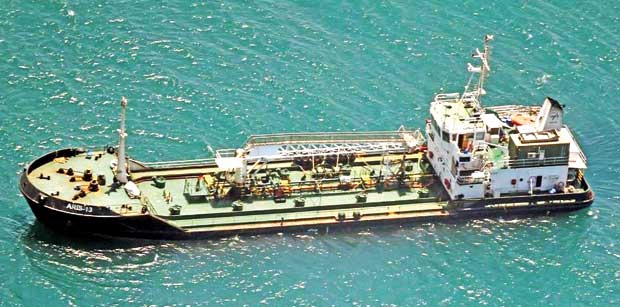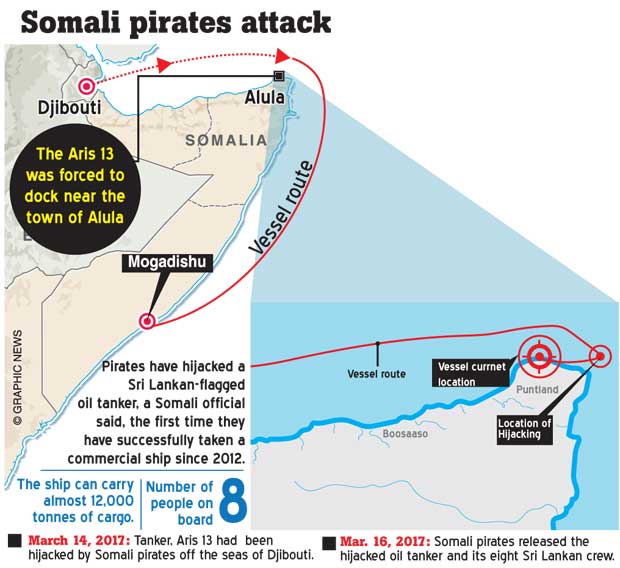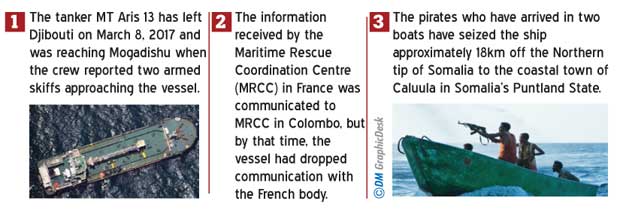Reply To:
Name - Reply Comment
Last Updated : 2024-04-20 16:40:00

 a breach of ‘jus cogens,’ a conventional peremptory international norm that needs to be upheld by states.
a breach of ‘jus cogens,’ a conventional peremptory international norm that needs to be upheld by states.
 - Ranjan Perera
- Ranjan Perera
Secretary General of National Union of Seafarers Sri Lanka (NUSS) and International Transport Workers’ Federation (ITF) local representative Ranjan Perera said the local agent was contacted when such an incident occurred.
“Later, the Shipping Ministry conveys the news to the family members of the victims. The Foreign Ministry has a bigger role to play in it. They handle it on behalf of the government. The ITF represents the interests of transport workers’ unions in bodies which take decisions affecting employment or safety in the transport industry including the International Labour Organisation (ILO), the International Maritime Organisation (IMO) and the International Civil Aviation Organisation (ICAO).”
Speaking further, Ranjan said a major function of the ITF was informing and advising unions about developments in the transport industry in other countries or regions of the world.
“The ITF organises international solidarity when transport unions in one country are in conflict with employers or governments and need direct help from the unions in other countries.”

Piracy off the coast of Somalia has been a threat to international shipping since the second phase of the Somali civil war in the early 21st century. According to OBP, piracy impeded the delivery of shipments and increased shipping expenses costing an estimated $6.6 to $6.9 billion a year in global trade in 2011. Somali piracy is unique among worldwide piracy business models due to the level of community support Somali pirates have enjoyed in the past and the ability to hold crews and vessels for months, or even years in ‘safe havens’ just off the coast during ransom negotiations.
After the fall of the Siad Barre regime in 1991, Somali piracy has raised its head, targeting vessels off the coast of Puntland and the Gulf of Aden in violent robberies. The hijack for ransom model developed significantly in the early 2000s, and became the primary model by 2005 when the number of these incidents shot from 2 to 14 in a single year.
Piracy has diminished since 2012 largely due to mitigating efforts at sea by international naval forces. However, the situation in Somalia that originally permitted piracy to flourish has not changed. This has paved the way for other forms of maritime crime including smuggling and trafficking.
According to OBP, this unfortunate incident marks the first hijacking since 2012, but it doesn’t indicate a large-scale return of Somali piracy. However, Somali pirates have still been active in recent months. The OBP analytics indicate the following:

The tanker MT Aris 13 had left Djibouti on March 8, 2017 and was reaching Mogadishu when the crew reported two armed skiffs approaching the vessel. The information received by the Maritime Rescue Coordination Centre (MRCC) in France was communicated to MRCC in Colombo, but by that time, the vessel had dropped communication with the French body. The pirates who have arrived in two boats have seized the ship approximately 18km off the Northern tip of Somalia to the coastal town of Caluula in Somalia’s Puntland State.
It was then confirmed that eight Sri Lankans were on board, namely, S.A. Nicholas (Captain) from Mattakkuliya, Ruwan Sampath (Chief Officer) from Matugama, J. Kalubowila (Chief Engineer) from Horana, Dileepa Ranaweera (Third Officer) from Galle, Janaka Samendra (Third Engineer) from Matara, Sunil Perera (Bosun) from Kandana, Lahiru Indunil Widanapathirana (Able Seaman) from Galle and A. Shanmugham (Cook) from Negombo.
According to Oceans Beyond Piracy, a programme of the One Earth Foundation, a privately-funded and independent non-profit organisation located in Colorado, USA, it was revealed that the MT Aris 13 was preparing to cut through the Socotra Gap between the tip of Somalia and the island of Socotra. This route is frequently used as a cost and time saving measure by vessels travelling down the East coast of Africa despite the threat of piracy. Additionally, Aris 13 has had a low freeboard of only three metres, and has been moving at a slow pace of five knots. These factors made the vessel an easier target for pirates who typically board ships with ladders from fast moving skiffs.
According to a UN shipping database, it was reported that MT Aris 13 was owned by the Panama company ‘Armi Shipping SA’ whose address was listed in care of Aurora Shipping Management FZE, a company based in Fujairah in the United Arab Emirates.
The pirates demanded a ransom and held the vessel in captivity and released the vessel on March 16 when they found that the vessel was hired by Somali businessmen. According to the pirates, their primary intention of hijacking the ship had not been collecting ransom, but protesting against illegal fishing practices carried out by international vessels, which have threatened the livelihoods of the local fisherfolk. The release followed a gunfight earlier in the day between the pirates and the marine force.

Add comment
Comments will be edited (grammar, spelling and slang) and authorized at the discretion of Daily Mirror online. The website also has the right not to publish selected comments.
Reply To:
Name - Reply Comment
On March 26, a couple arriving from Thailand was arrested with 88 live animal
According to villagers from Naula-Moragolla out of 105 families 80 can afford
Is the situation in Sri Lanka so grim that locals harbour hope that they coul
A recent post on social media revealed that three purple-faced langurs near t